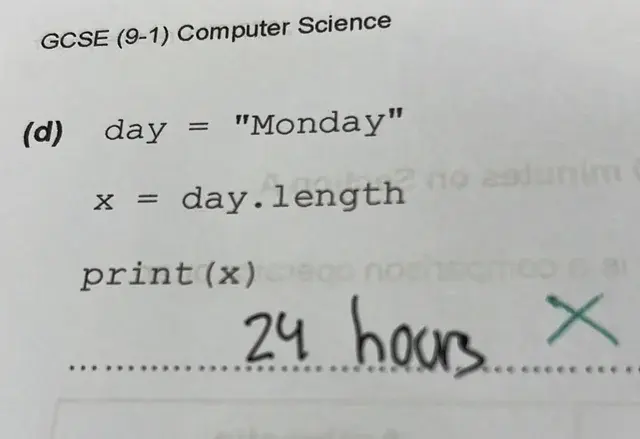this post was submitted on 24 Mar 2024
788 points (98.6% liked)
Programmer Humor
23422 readers
1719 users here now
Welcome to Programmer Humor!
This is a place where you can post jokes, memes, humor, etc. related to programming!
For sharing awful code theres also Programming Horror.
Rules
- Keep content in english
- No advertisements
- Posts must be related to programming or programmer topics
founded 2 years ago
MODERATORS
you are viewing a single comment's thread
view the rest of the comments
view the rest of the comments

Is it wrong that I'm stuck trying to figure out what language this is?
Trying to figure out what string.length and print(var) exist in a single language.... Not Java, not C# (I'm pretty sure its .Length, not length), certainly not C, C++ or Python, Pascal, Schme or Haskell or Javascript or PHP.
OCR exam language, a pseudocode format.
This could run in Javascript if you setup print as an alias for window.alert or console.log
It can run in regular JS;
print()just prints the page (ignoring the passed value).undefinedThe QuickJS interpreter has
printas a built-in alias forconsole.log.I’m very much guessing that this is just supposed to be a type of pseudocode given the context and vagueness of it.
It’s a big reason why I really dont like pseudocode as instruction to people learning the basics of what programming is. It made more sense 20 years ago when programming languages were on a whole a lot more esoteric and less plain text, but now with simple languages like Python there’s simply little reason to not just write Python code or whatever.
I took an intro to programming class in College and the single thing I got dinged on the most is “incorrect pseudocode”, which was either too formal and close to real code or too casual and close to plain English.
It’s not a great system. We really need to get rid of it as a practice
Especially since python is right there.
I mean once you get beyond bash-like scripts python is esoteric as fuck, adding oop to what is essentially a shell is a terrible idea
That said, there's plenty of languages with good syntax that is still good when you get into more complex stuff (modern C#, scala, kotlin and more)
The only thing esoteric about python is the bolted-on typing and anything behind a double underscore.
So yeah, it's there, but in front of the curtain it's practically pseudo code.
I think you’re missing the forest for the trees here pretty heavily.
Yes, Python has some goofy aspects about managing it while performing high level, in depth tasks.
This is a post and a comment chain about pseudocode being taught to people who likely just learned what a “programming language” was several weeks ago. Essentially no one taking the GCSE knows what “bash-like scripts” even means.
I disagree. Python is not "esoteric" when making objects. The syntax is certainly easier than in Java.
And VisualBasic's syntax is easier than COBOL, but this isn't a competition to make the least offensive heap of putrid garbage, so why does it matter?
Python works just fine for basic scripts, frankly it's amazing for it, but oop and functional programming is so incredibly obviously badly shoehorned in that huge swathes needs scrapping and version 4 releasing
Then help me understand please. What do you mean by "esoteric" in regards to oop in Python compared to a language better suited for it?
What part(s) of python do you think is esoteric?
Wut
Reminds me of 7th grade math class, chapter on estimating. Assignment was "Estimate the following values" with problems like 42+28=? or 14*3=?
One of them was 6*7=? Which having memorized my times tables in 4th grade like they told me to, I knew off the top of my head that it's 42. I wrote that. And it was marked wrong because I was too precise.
In the 90s my high school used Pascal. That seems reasonable if you only want to teach procedural
Just pseudocode.
JavaScript has
[string].lengthdoesnt have
printnor allow variable declaration without keywordsprint()will print the text to a physical printer with paper and everything. Don't confuse it withconsole.logand use it in a loop.it's so rough learning this by accident
It would have print if it was previously declared as function.
Also, js is as dirty as you want it to be. Keywords are indeed not necessary for declaring variables.
JavaScript is the language of the assassins, with its infinitely modifiable prototypical setup
Nothing is true
true !== 1truetrue + true + true === 3trueEverything is permitted
[]+[]''Sure you can write
foo = 3in JavaScript. It’s a global variable and can be referenced as eitherfooorwindow.foo.This is quite a cheap answer but maybe it's just pseudo code. We had exercises in university about pseudo code with examples that intentionally broke all syntax systems and conventions to show that not everything has to be executable that you write down in a theoretical computer science homework
It's a shitty question. It's implied by the fact that "24" is wrong that the answer is "6", the length of the string "Monday".
In some languages dot access on objects could give you the properties of the object type (things pertaining to a "day" object) but this would still be ambiguous since a day's length can be measured in many different ways.
In others, it would require you to call length as a function (.length()) or not be available at all, or require you to pass the object into another function [ length_in_seconds(day_x)]
I think the question is fine, but we have to assume they covered this type of method prior to the exam, where .length would result in the character count of a String.
My headcanon: it's a language that gets executed by a LLM. Whatever you write, if the LLM can make sense of it, it will execute it.
The output may well be "24 hours".
That recurring puzzle is among the most interesting aspects of this community, IMHO.
It’s weird that people are so focused on it. It’s pseudocode, and it’s purely meant for day one comp sci students to grasp how data is stored and processed, before they are forced into writing Java, most likely
Most irritating aspect of switching languages. How are switches done in this one again?
•Searches web•
Ah yes
To be honest, that was the biggest value proposition of GitHub Copilot.
It could be Ruby;
putsis more common, but there is aprint. With some silly context, the answer could even be correct:Pseudocode and/or a variant of lua.
Scala and Kotlin are close ones, although those requires variables to be declared with
var day = “Monday”(unless the variables are declared elsewhere)Same thoughts I had.
name = valuewithout any keywords or its a variable declared outside of the example.lengthand not.lenor other.lengthis also a property and not a method? Assuming convention.length()for method call likeprint(x)Why not Python? Because it needs print(str(x))?
It's len(str) in Python. Not str.length.
Ohhh thanks